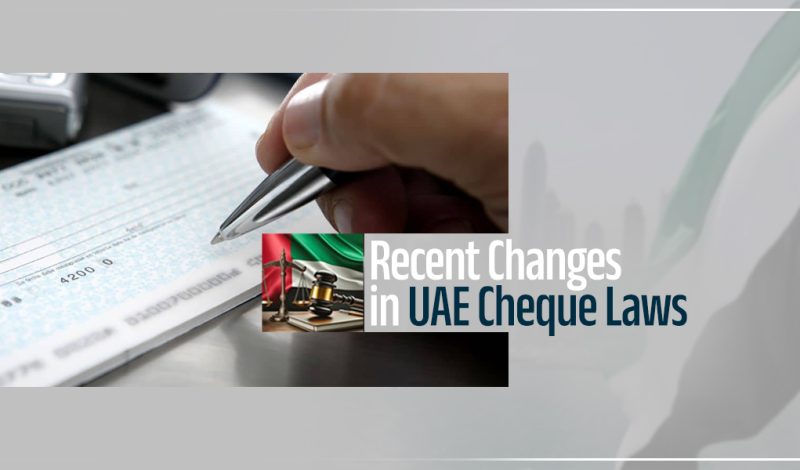Understanding the Recent Changes in UAE Cheque Laws
The United Arab Emirates (UAE) has implemented significant amendments to the cheque laws, transitioning from a criminal to a civil framework. These changes aim to streamline the legal process surrounding bounced cheques and the enforceability of cheques as financial instruments. This article delves into the key changes, the implications of a bounced cheque under the new law, and potential solutions for those affected.
Transition from Criminal to Civil Offense
Prior to early 2022, a cheque dishonour without sufficient funds in the UAE was classified and tried as a criminal offence. Offenders faced criminal prosecution, blacklisting, and could be brought before judges in the criminal court.
However, the 2nd January 2022 amendments transformed the handling of cheque return due to insufficient funds thus categorising them as civil rather than criminal matters.
Key Changes:
- Civil Classification: Cheque dishonour for insufficient funds is now classified as a civil offence. This means that instead of facing criminal prosecution, the cheque issuer can be subject to civil actions, including travel bans, but without the risk of imprisonment.
- Direct Execution: Cheques that return due to insufficient funds are now considered executive instruments under Article 635 Bis of Commercial Transactions Law. This allows the bearer to take immediate legal action to recover the amount without needing a court judgement. The case can be brought directly before the execution court.
- Partial Payments: Banks are required to partially honour a cheque if there are insufficient funds, unless the bearer rejects the partial payment. A certificate will be issued for the remaining balance (Article 617).
What Happens If a Cheque is Bounced for insufficient funds Under the New Law
Under the new legal framework:
- No Arrest Warrants: Cheque-related civil cases do not result in arrest warrants in Dubai. Instead, a travel ban may be imposed on the offender.
- Travel Ban Implications: A travel ban can hinder renewal process of Documents including visa renewals and restrict international travel. However, In most cases this can be lifted through court with the help of proper legal assistance.
- Execution Court Process: Once a cheque is presented before an execution court, the defendant has 15 days to file an objection or appeal. Failure to respond within this period voids the opportunity to contest the case.
Objection and Appeals
Defendants have the right to contest the execution of a bounced cheque:
- Appointment of a Banking Expert: Defendants can file an objection within 15 days of receiving the execution notice. If there is a significant difference between the cheque amount and the actual debt. The court can appoint a banking expert after the respective fee is paid and then the expert will submit a report to determine the precise amount owed which shall be binding in the court.
- Legal Representation: Engaging a lawyer and covering the costs of appointing an expert can be beneficial, especially when the difference in amounts is huge.
Managing Travel Bans
- Initial Payments and Guarantees: To lift a travel ban with the help of legal assistance a request can be made to the court where the court after review may direct to make an initial payment 20-30% of the total amount and allow the rest of the payments as instalments. The process is at the discretion of the court.
- Emergency Lifting: In urgent situations, presenting sufficient financial guarantees and partial payments may expedite the lifting of travel bans.
Closed or Dormant Accounts
While most bounced cheque cases are treated as civil, certain scenarios retain their criminal nature:
- Signature Differences and Account Closure: If a cheque is executed with a different signature or from a closed/dormant account, it is treated as a criminal case. Penalties include fines and potential imprisonment.
- Subsequent Civil Actions: Beneficiaries can file additional civil cases to recover the owed amount even after criminal proceedings.
Time Constraints
- Presentation Period: Cheques must be presented for payment within six months. Failure to do so may result in dishonour, but the beneficiary can still pursue legal action to claim the cheque’s value.
Fines and Penalties
According to Article 674 of the Commercial Transaction Law:
- Issuing Cheques Without Funds: Individuals knowingly issuing cheques without sufficient funds or with the intent to dishonour them face fines ranging from a minimum of 10% of the cheque’s value (not less than AED 1,000) up to the cheque’s full value.
Preventive Measures
- Maintain Account Health: Ensure that sufficient funds are always available before issuing cheques to avoid civil and potential criminal repercussions.
- Monitor Cheque Validity: Present cheques within the six-month validity period to prevent dishonour and subsequent legal actions.
- Verify Account Status: Avoid issuing cheques from closed or dormant accounts to prevent cases from being treated as criminal offences.
Conclusion
The 2022 amendments to the UAE’s cheque laws represent a significant shift from criminal prosecution to a civil approach in handling bounced cheques. While this transition aims to simplify legal processes and improve debt recovery mechanisms, understanding these changes, adhering to legal requirements, and seeking professional assistance are crucial to avoiding legal complications in the UAE’s financial environment.

